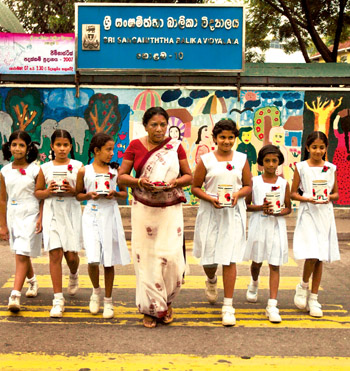Poppy Day in the Sri Lankan context
Janaka PERERA
On Sunday November 11 another Poppy Day (Remembrance Day) was held
with the usual ceremony at the War Memorial, Colombo. How relevant is
this commemoration to Sri Lanka today? As in the decades following the
First World War this question has been raised again by many people
including retired military officers.
The controversy seems to stem from the fact that during both World
Wars Sri Lanka - like most parts of South and South-East Asia - was a
European colony.
This country participated in the two World Wars not as an independent
nation but as part of the British Empire. In WW I a small contingent of
Sri Lankans, among them Richard Aluvihare (later independent Sri Lanka‘s
first Inspector General of Police), participated and a few died in
action.
|

School children selling poppy flowers |
Between the two global conflicts, the local Marxists and many others
treated Poppy Week as pure and simple poppy cock - a means of colonizing
the minds of the natives, who gained nothing from the ‘Imperialist War’
(World War I). Monies collected by the sale of artificial poppies went
to meet the needs of disabled war veterans (mostly British, Australian
and Canadian) in the Empire.
The Poppy was adopted as the symbol of remembrance because it was so
widespread on the battlefields of Europe after World War I (1914-1918),
which ended on a November 11.
The soil disturbances caused by trench-digging and shellfire produced
ideal conditions for poppies to grow, and they appeared in vast numbers
bringing a delicate beauty to areas which had seen such terrible scenes.
The Marxists in Sri Lanka launched a ‘counter-offensive’ in the form
of the Suriyamal (Sun Flower) Campaign that gained immense popularity.
Suriyamala became a symbol of defiance against British Imperialism. Then
in September 1939 began World War II with Hitler’s invasion of Poland.
By then the political landscape in Asia has changed vastly. Japan had
allied herself with Nazi Germany. The independence struggle in
neighbouring India had reached its peak. And Japan claimed that she was
fighting to liberate South-East Asia from “white imperialism.”
Asian patriots like Subhas Chandra Bose, Aung San and Sukarno sought
Tokyo’s help to fight against European colonialists.
This World War thus is of greater significance to us than the
previous one since it hastened the end of European colonialism in Asia,
even though Japan lost the war.
To the local Left however this conflict too was just another
‘imperialist war’ - that is until Germany attacked the Soviet Union,
which had earlier signed non-aggression pact with Hitler.
Suddenly the Marxists found themselves in a dilemma. Doctrinaire
Socialists split hairs over the Nazi offensive. What was until then an
‘imperialist war’ became overnight a ‘people’s war’ to the Stalinists.
The Trotskyites (LSSP) refused to fall in line and promptly expelled
Dr. S.A. Wickremasinghe and Trade Unionist M.G. Mendis from the party.
The Stalinists in turn parroting their mentors in Moscow accused the
LSSP of being ‘Fascist Agents’ and ‘Fifth Columnists.’
With Russia joining the Western Allies against the Nazi-Fascist Axis
powers the Sri Lankans who volunteered to serve in this war as members
of the Ceylon Light Infantry, Ceylon Garrison Artillery, the British
Royal Army Service Corps and the Royal Air Force and the Royal Naval
Volunteer Reserve too became - in the eyes of the pro-Moscow Communists
- heroes in the international struggle against Fascism. (The most
decorated Asian in the Royal Air Force was a Sri Lankan - Rohan
Ekanayake Amarasekera - later Air Vice Marshal)
But as General Lalin Fernando (Rtd.) says the organizers of the Poppy
Week in Sri Lanka seem to be unconcerned with the fact that the name of
not a single Sri Lankan serviceman appears on the Memorial in Colombo
although it has the names of hundreds of British residents in Ceylon who
sacrificed their lives for their country in both World Wars inscribed on
it.
Gen. Fernando also notes the fact that India and Pakistan (both then
British India ) that contributed 2.5 million troops to the two World
Wars do not commemorate Poppy Day.
Instead he suggests that Sri Lanka and her Security Forces observe
May 22 as Remembrance Day in honour of 20,000 personnel who paid the
supreme sacrifice in defending the country’s sovereignty and territorial
integrity over the past two decades.
On this day all regiments and corps of the Sri Lanka Army and Navy
and the Air Force backed by the Rana Viru Authority take part in the
ceremony at the national war memorial which is at Mylapitiya off Kandy
where a huge torch with an eternal flame overlooks the site from a hill
above. |

